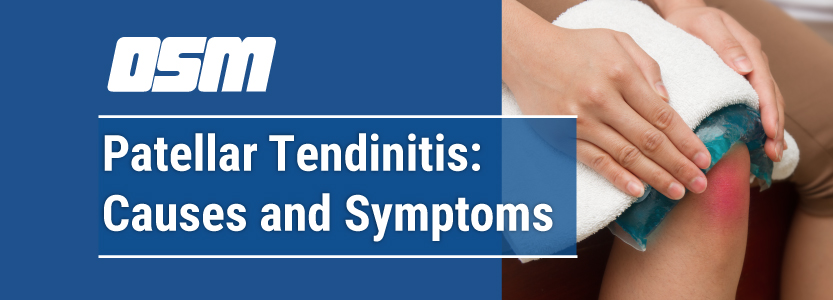Patellar Tendinitis: Causes and Symptoms
Article featured on Mayo Clinic
Overview
Patellar tendinitis is an injury to the tendon connecting your kneecap (patella) to your shinbone. The patellar tendon works with the muscles at the front of your thigh to extend your knee so that you can kick, run and jump.
Patellar tendinitis, also known as jumper’s knee, is most common in athletes whose sports involve frequent jumping — such as basketball and volleyball. However, even people who don’t participate in jumping sports can get patellar tendinitis.
For most people, treatment of patellar tendinitis begins with physical therapy to stretch and strengthen the muscles around the knee.
Symptoms
Pain is the first symptom of patellar tendinitis, usually between your kneecap and where the tendon attaches to your shinbone (tibia).
Initially, you may only feel pain in your knee as you begin physical activity or just after an intense workout. Over time, the pain worsens and starts to interfere with playing your sport. Eventually, the pain interferes with daily movements such as climbing stairs or rising from a chair.
When to see a doctor
For knee pain, try self-care measures first, such as icing the area and temporarily reducing or avoiding activities that trigger your symptoms.
Call your doctor if your pain:
- Continues or worsens
- Interferes with your ability to perform routine daily activities
- Is associated with swelling or redness about the joint
Causes
Patellar tendinitis is a common overuse injury, caused by repeated stress on your patellar tendon. The stress results in tiny tears in the tendon, which your body attempts to repair.
But as the tears in the tendon multiply, they cause pain from inflammation and weakening of the tendon. When this tendon damage persists for more than a few weeks, it’s called tendinopathy.
Risk factors
A combination of factors may contribute to the development of patellar tendinitis, including:
- Physical activity. Running and jumping are most commonly associated with patellar tendinitis. Sudden increases in how hard or how often you engage in the activity also add stress to the tendon, as can changing your running shoes.
- Tight leg muscles. Tight thigh muscles (quadriceps) and hamstrings, which run up the back of your thighs, can increase strain on your patellar tendon.
- Muscular imbalance. If some muscles in your legs are much stronger than others, the stronger muscles could pull harder on your patellar tendon. This uneven pull could cause tendinitis.
- Chronic illness. Some illnesses disrupt blood flow to the knee, which weakens the tendon. Examples include kidney failure, autoimmune diseases such as lupus or rheumatoid arthritis and metabolic diseases such as diabetes.
Complications
If you try to work through your pain, ignoring your body’s warning signs, you could cause increasingly larger tears in the patellar tendon. Knee pain and reduced function can persist if you don’t tend to the problem, and you may progress to the more serious patellar tendinopathy.
Prevention
To reduce your risk of developing patellar tendinitis, take these steps:
- Don’t play through pain. As soon as you notice exercise-related knee pain, ice the area and rest. Until your knee is pain-free, avoid activities that put stress on your patellar tendon.
- Strengthen your muscles. Strong thigh muscles are better able to handle the stresses that can cause patellar tendinitis. Eccentric exercises, which involve lowering your leg very slowly after extending your knee, are particularly helpful.
- Improve your technique. To be sure you’re using your body correctly, consider taking lessons or getting professional instructions when starting a new sport or using exercise equipment.
The Orthopedic & Sports Medicine Center of Oregon is an award-winning, board-certified orthopedic group located in downtown Portland Oregon. We utilize both surgical and nonsurgical means to treat musculoskeletal trauma, spine diseases, sports injuries, degenerative diseases, infections, tumors and congenital disorders.
Our mission is to return our patients back to pain-free mobility and full strength as quickly and painlessly as possible using both surgical and non-surgical orthopedic procedures.
Our expert physicians provide leading-edge, comprehensive care in the diagnosis and treatment of orthopedic conditions, including total joint replacement and sports medicine. We apply the latest state-of-the-art techniques in order to return our patients to their active lifestyle.
If you’re looking for compassionate, expert orthopedic surgeons in Portland Oregon, contact OSM today.
Phone:
503-224-8399
Address
1515 NW 18th Ave, 3rd Floor
Portland, OR 97209
Hours
Monday–Friday




